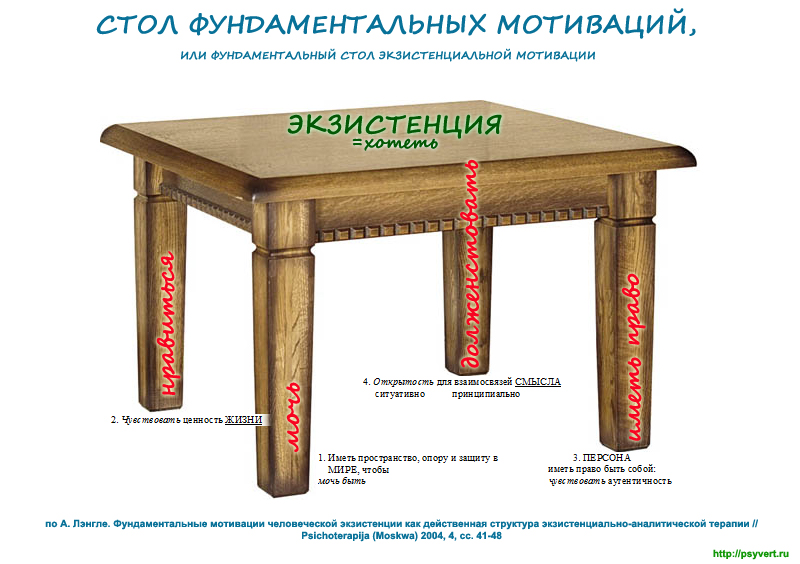My approach
"We find in life exactly what we put into it."
Ralph Waldo Emerson
Every psychologist is an adherent of one or another school in psychology. If your work with a professional becomes permanent, you follow the path outlined by his school.
Personally, I am a representative of the school of existential analysis. This method is close to me not only because of its effectiveness, but also because of its depth and involvement with the very foundations of human nature. A fulfilled life, from the point of view of existential analysis, stands on four pillars, which can be compared to the legs of a table — take one away, and the structure becomes unstable.

The first pillar is having the space, support and protection in the world. When one has them, he or she feels accepted, thanks to this he or she accepts others. Violation of this basic existential condition leads to the development of fears.
The second pillar is a sense of the value of life. Here a person answers the question: "I live, but do I like this life? Do I feel its fullness? Do I have time for what I consider valuable?" The feeling of the value of life is manifested in attention to oneself, which, in turn, allows one to treat the values of loved ones with respect and attention. A lack of this basic feeling often leads to depression.
The third pillar is a sense of one's own uniqueness and the right to be oneself. Man is driven by a fundamental spiritual question: "I am myself, but do I have the right to be the way I am? Do I respect myself?" Deficiency of this feeling leads to hysterical reactions.
The fourth pillar is your own meaning of life. Here a person answers the question: "Is there a meaning in my life? What do I live for? Is there something more than myself, with which I associate myself?" The lack of manifestation of the meaning of life leads, first of all, to addictions.
Why existential analysis?
In terms of relief of psychological problems, the effectiveness of different approaches is almost the same. What is not the same is the facets of personality that people discover in themselves in the course of working with a psychologist. The way they see themselves in the end.
Often clients describe their lives in this way: “life passes me by”, “I don’t live”, “it’s as if I don’t exist”. And others echo: "You are not with us." These states are based on shame, guilt, as well as unexpressed aggression and fear, paralyzing any initiatives and actions. As a rule, this psychological mechanism is formed in childhood, with people who are important to us.
Emotional burnout, panic attacks, anxiety, aggression - all these problems indicate that you need to pay attention to your position in life, to your deepest essence. After all, deep behind psychological problems is the true essence of a person, which shows itself in the course of working with a psychologist.
This process often reminds me of thawing. As one client said, "I feel defrosted." Trauma "anaesthetizes" your soul with pain, resentment and unexpressed aggression, and therapy releases feelings after a long freeze. I rejoice when clients begin to understand themselves better after depression. I rejoice when at a certain moment I hear: "I belong to myself. I feel myself."
Working with a psychologist, people often not only find an answer to a pressing question, but also get to know themselves better, begin to appreciate themselves more, and to grow as a person. The real value of oue personality does not make us selfish, but allows us to gain a sense of security, freedom and a fulfilled (happy) life.
If a person says "I did everything right, why did this happen to me?" or "I don't want anything, I have apathy, and life has no meaning", we are looking for hidden, unaddressed aspects of their life.
What does it take to live a fulfilling life? What keeps a person from daring to live differently, from having overcome shame and fear, creating a project of their life, or opening their own business? Existential analysis seeks answers to these and other questions.
History of the method
Existential analysis is one of the schools of modern psychotherapy based on the Western European philosophical tradition of phenomenology and existential philosophy. The modern existential analysis of Alfried Langle is a continuation and deepening of logotherapy — the method of the outstanding Austrian psychologist Viktor Frankl.
Logotherapy, as a separate method of existential analysis, was founded by Frankl in 1920, and served as the foundation for the Third Viennese School of Psychotherapy (after the psychotherapy of Sigmund Freud and Alfried Adler).
Logotherapy is "a therapy of treatment by meaning" or "meaning-centered psychotherapy". The search for meaning awakens the person’s freedom, their responsibility for their own life, for his decisions and choices.
GLE-International
The international society of logotherapy and existential analysis — GLE-International — operates in Austria, Germany, Switzerland, Italy, Finland, Czech Republic, Hungary, Argentina, Canada, Russia and Israel.
Its purpose is further developing and introducing existential-analytic anthropology and its application in psychotherapy, education, pastoral ministry, social work and management. The method is also used in medicine, training in negotiation techniques and conflict mediation.
With state recognition in Austria, Germany and Switzerland, GLE trains psychotherapists and counsellors in existential analysis and logotherapy, and offers an ever-expanding range of retraining programs in therapy, counselling, pedagogy, philosophy and social care.
The GLE-International is a member of the International Federation for Psychotherapy (IFP), the European Association of Psychotherapy (EAP), the International Society of Depth Psychology and the Martin-Heidegger Society.
The GLE-International was officially registered in 2002 as the international association.
